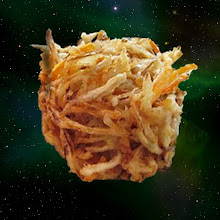Already in this saga I notice a few repeated themes, or recurring situations. First, the situation where a woman gets "carried off", in other words kidnapped away from her family and then married to the guy who does this. In the first case, the children from that marriage weren't considered legitimate and therefore had no rights to their father's estate, even though it ended up getting passed out of their family entirely. On page 20, Thorolf says, "I don't even consider that you have any birthright, because I am told that your mother was taken by force and carried off to your father's house." In the next generation, the same sort of thing happens between Bjorn and Thora, but in their case, eventually a settlement was made and so far it seems that everyone is happy. Probably because Bjorn did not have any pre-existing children who would want to discredit the marriage.
There were also two main gifts given so far in the story. The first notable one was the ship given to Eirik, while he was young, by Thorolf Skallagrimsson. This "gift" was clearly a thinly veiled attempt to get on his good side, but it works for at least a while. Thorolf seems interested in patching up some of the hard feelings between the Norwegian royals and his family, but his father is skeptical, just as his grandfather was skeptical of his uncle Thorolf's efforts before he died.
The second gift that I took note of was the axe given to Skallagrim by King Eirik. I was confused as to why exactly it broke and what parts of it were broken. Did it break because Skallagrim was too strong and the axe went straight through to the stone? We already saw that he was supposed to have some super-strength abilities when he dove for a stone that "would take four men to move today" so that would be plausible. Or is the point that the axe was shiny and looked nice, but not the kind that would actually stand up to hard use? Either way, I think it provides a symbolic contrast between the type of person Skallagrim is versus Eirik. Was it really given with malicious intent? It's hard to say, but Thorolf secretly gets rid of the damaged axe instead of spitefully returning it the way his father asked him to, which further reinforces his role as the would-be peacekeeper.
Partway through I noticed some references to children being sprinkled with water, including Egil and Thorolf, which I looked up in the glossary and found out that sprinkling was part of the naming ceremony and initiation into society, so it doesn't necessarily have the Christian connotations that my mind jumped to at first. There's also the occasional reference to a person who practices witchcraft or a feast to go along with a sacrifice being made. Both of these show that at the time of this saga, beliefs in the ancient mythology and traditions were a part of most people's lives.
I thought it was sort of humorous the way Egil was portrayed as a kid, partying with the adults and spouting poetry, then bashing in other kids' heads over a game! I took these passages as tall tales, much like the American folk tales of Paul Bunyan and Davy Crockett ("killed 'im a b'ar when he was only three!"). The narrative seems to suggest that his intensity is at least partly inherited from his father and grandfather. I suppose Egil might be a good poster child for the nature-versus-nurture argument: Did he get his disruptive traits through genetics, or were they encouraged by his family, which seems to have endorsed the philosophy of "stab first and ask questions later (see pgs. 44-45)"?
Subscribe to:
Post Comments (Atom)




No comments:
Post a Comment